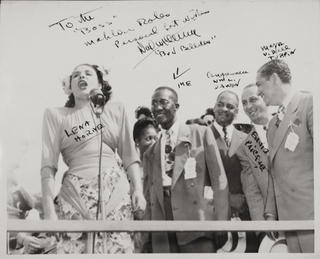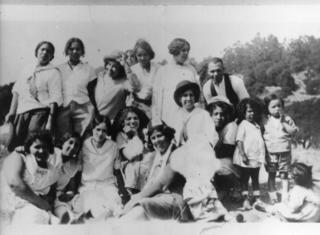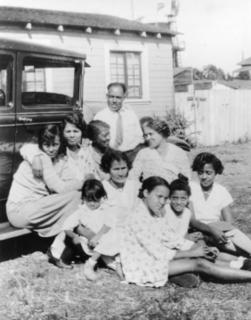
Time for crowing ...
I've been wandering around in the past for the last few weeks -- started with Katrina and with my concern about the possible loss of kinfolk and a culture that I should have forgotten long ago but haven't. Those ties of family and culture are obviously unbreakable as long as one's memories withstand the ravages of time.
But that's all in the background of my life. It's the foreground that is so commanding these days. The 60-day emergency hire under which the National Park Service brought me in will expire on September 30. But in the interim, a new park superintendent has been brought in, a new phase of the work of park development has commenced, and the work of liaison between the park and the community has moved into sharper focus. They've found funding to keep me into some indefinite future. It's open-ended, but then so am I, right? I'll be hired as a full-fledged national park staffer when my contract ends. Maybe my classification will be "Living Artifact." Maybe folks will be required to wear those little museum white gloves in order to shake my hand. Don't know. But it feels good.
The prior 7-8 years of my work life involved facets that are at this point of great value to a developing park. Having been a field representative for two members of the State Assembly -- I've become a valuable asset (albeit of some vintage), with experience that is not only relevant but not easy to duplicate in younger careerists.
Age brought with it a new confidence that continues to amaze even me. It's only since I reached 80 that I'm able to say with assurance, "I know!" No longer do I wait around for some Avatar to deliver me or those who trust me for answers that I no longer expect to find, or that don't exist, or are unattainable over the course of any single lifetime. I not only know, but I'm willing to act on the knowing. This doesn't imply, however, that I'm necessarily correct in what I know -- just that I've become quite comfortable with conflicting truths and can live nicely with ambiguity.
The past 4 years have been more exciting than any that came before -- except maybe for the exultation of becoming a parent. Delivering my firstborn, Robert Thomas Reid, still stands out as tops -- absolutely the best. That sense of participating in the creation of life is equalled by no other experience. The thrill of David's birth followed by Dorian's is as keen today as on the days they came into the world.
What's so exciting? Well, this week I worked on several projects that should lead to greater involvement with the host community of Greater Richmond. I have a co-worker whom I adore -- who is enthusastic and appreciative of my efforts -- and who knows all that technical stuff that remains mysterious and thrilling to me -- like Googling into space and back at the flick of the finger. I just leave all that stuff up to the genie.
Yesterday I narrated into a magical little machine -- the size of a matchbox -- a 450-word piece on Black History of World War II that will underlay a slide show of photos of untold stories of the period. Spent the earlier part of the week producing that -- and am satisfied with what developed. It will carry a soundtrack of music appropriate for the time (probably instrumental jazz/blues kind of stuff), and will be used to stir the disclosure of other untold stories by those homefront workers who might be still around.
On October 7th and 8th I'll be representing the park by participating on a panel about Women of World War II in a Women's History Conference at Mills College in Oakland. For November and again in January we're working on two Leadership Guided Tours of the Rosie the Riveter World War II Homefront Historic National Park (henceforth abbreviated to HNP). Will then begin to develop a script for tour guides that can be translated into several of the many languages represented in Greater Richmond -- so that Laotian, Latino, etc., groups can provide their own tours from their own centers.
As an indication of some of the lost conversations and untold stories:
Did you know that there were ships names for 17 African Americans? Three of those were built in the Kaiser Shipyards in Richmond, California; the SS Robert S. Abbott; the SS George Washington Carver, and the SS Harriet Tubman. In addition there were several ships named for historically black colleges; Fisk, Talledega, Xavier, and Lane. But by far the most interesting to me was the launching of the SS Ethiopia and the SS Toussaint L'Overteur -- both in the year 1944. This, at a time when racial segregation was at its height and the Klan still riding high not only in the South, but was now transplanted to the streets of Richmond by those who came west to work in the war plants. How I'd love to gain access to the papers of the deliberations that led to the decision to so honor the "Black Napoleon," the former slave who defeated Napoleon in the Battle for Haiti at the end of the 18th Century.
Richmond is oddly enough, a city with little sense of or appreciation for its history. Easy to understand when one realizes that it was a sleepy little company town (Standard Oil) of around 20,000 until it ballooned overnight in 1942 when 110,000 made their way west to help to build the ships in the 5 Kaiser shipyards that lined the shoreline. Almost everyone was new. Most were from Oklahoma, Arkansas, Louisiana, and Texas. Those folks (black and white) weren't yet sharing drinking fountains or cemetaries or hospital wards. They wouldn't for another 20 years. They brought "the South" with them.
The archives and the library just outside my cubicle hold theses, photographs, artifacts, slides, posters of the period, oral histories, recently-written books by historians who are only now discovering the period. After all, 60 years isn't a great enough timespan to invite much scholarly investigation as history. Those 60 years, however, represent the Lion's share of my life -- but apparently not the most productive years.
These may be the most productive yet.
Ain't that a hoot?
Photo: A very young Lena Horne singing at the launching of the SS George Washington Carver at Kaiser Shipyard #3 in 1944.


